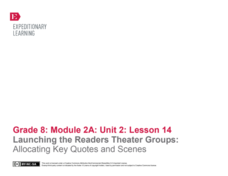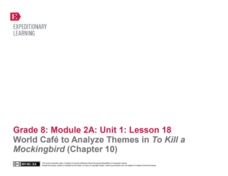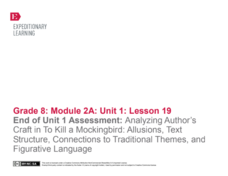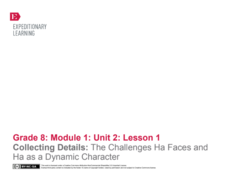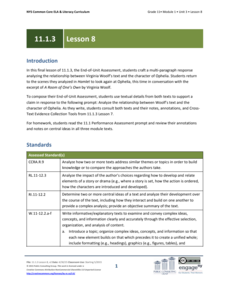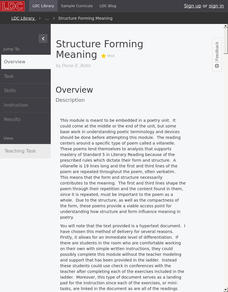EngageNY
Launching the Readers Theater Groups: Allocating Key Quotes and Scenes
There's no I in collaboration! Scholars work in small groups to write a Readers Theater script for a scene from Harper Lee's To Kill a Mockingbird. Next, within their small groups, pupils discuss how their scenes communicate the main...
Literacy Design Collaborative
Analyzing the Development of Theme through Pivotal Moments
Liliana Heker's "The Stolen Party" and Martha Salinas' "The Scholarship Jacket" provide sixth graders with an opportunity to identify key scenes that authors use to develop their themes.
EngageNY
World Café to Analyze Themes in To Kill a Mockingbird (Chapter 10)
Time for table discussions. Scholars once again take part in a World Cafe activity. They discuss chapter 10 of To Kill A Mockingbird in groups of four and rotate from table to table. At each table, they select a new leader. Readers then...
EngageNY
End of Unit 1 Assessment: Analyzing Author’s Craft in To Kill a Mockingbird: Allusions, Text Structure, Connections to Traditional Themes, and Figurative Language
Scholars demonstrate their learning with an end-of-unit assessment. They work independently to discuss the Golden Rule and its relationship in To Kill a Mockingbird.
EngageNY
Making Inferences: The Golden Rule and the Radley’s Melancholy Little Drama (Chapter 4)
Time for a TED Talk. Class members watch a TED Talk clip covering Karen Armstrong and the Golden Rule. Once finished, they use Turn and Talk to discuss the questions in their Golden Rule Note-catchers. As a closing, they reflect on the...
EngageNY
Analyzing How Literature Draws on Themes from the Bible and World Religions: The Golden rule (Chapter 3)
Scholars use their Golden Rule Note-catcher to examine passages from To Kill a Mockingbird. They then take a gallery walk to compare and contrast the quotes before sharing Think-Write-Pair-Share ideas on how the quotes demonstrate the...
EngageNY
Introducing Final Performance Task and Analyzing Statistics
How do statistics help people understand the universal refugee experience? Using the resource, scholars engage in an activity called a Chalk Talk, working in teams to analyze statistics from informational texts about refugees. Also, they...
EngageNY
Close Reading: Paragraph 4 of “Refugee and Immigrant Children: A Comparison”
Why is reading a text closely a helpful skill? Using the 13th of 20 lessons from the Grade 8 ELA Module 1, Unit 2 series, scholars continue reading the informational text "Refugee and Immigrant Children: A Comparison." They work with...
EngageNY
Rereading and Close Reading: Communism, “The Vietnam Wars,” and “Last Respects” (Pages 85 and 86)
What might a papaya symbolize? Using the resource, scholars look for examples of symbolism in the novel Inside Out & Back Again. They also participate in a silent discussion called a Chalk Talk, writing their responses to a...
EngageNY
Collecting Details: The Challenges Ha Faces and Ha as a Dynamic Character
What is a dynamic character? Using an interesting resource, scholars set out to answer the question. They create graphic organizers to collect details about character development as they read the novel Inside Out & Back Again. They...
EngageNY
Grade 11 ELA Module 1: Unit 3, Lesson 8
How does the theme of gender inequality develop in Virginia Woolf's A Room of One's Own and Shakespeare's Hamlet? Pupils craft a multi-paragraph response to analyze the relationship between the texts. They use evidence from both works to...
PBS
The Symbolism of Sunflower Seeds in Ghost
Ghost by Jason Reynolds is a coming-of-age book that resonates with teenagers who have experienced childhood trauma. Explore the novel with an interactive resource that focuses on the author's use of symbolism, particularly with...
Literacy Design Collaborative
Structure Forming Meaning
Teach literary lovers how to form opinions about form. Scholars read
informational text about the form used in villanelles. After analyzing
the structure used in the poetry with graphic organizers and gallery
walks, writers create...
Literacy Design Collaborative
Whom Do We Trust, and Why?
Is it possible to regain trust? Scholars put much thought into the subject of trust after reading Shakespeare's Macbeth. Readers work together to analyze how the character relationships develop the a message about trust. They then...
EngageNY
Grade 11 ELA Module 1: Unit 1, Lesson 5
Scholars analyze words to determine the central idea of the poem My Last Duchess. Pupils begin by discussing homework and then form pairs to work through a list of questions about the poem. Finally, they complete a brief writing prompt...
EngageNY
Grade 10 ELA Module 4: Unit 2, Lesson 2
What is the best way to determine the theme of a text? Pupils analyze how central ideas emerge in Shakespeare's tragedy Macbeth. They work in small groups and engage in a whole-class discussion to discuss the play's plot. Finally,...
Literacy Design Collaborative
Macbeth: Influence of Supernatural
Something wickedly wonderful this way comes in a lesson that focuses on Macbeth. After a close reading of the play, class members craft a literary analysis essay in which they use evidence from the text to show how Shakespeare uses the...
Literacy Design Collaborative
Author Study: Kate Chopin
Four stories by Kate Chopin offer high schoolers an opportunity to demonstrate their understanding of the ways authors use various literary elements and movements to develop their themes and social commentaries.
Pace University
Short Stories
A reading of Kevin Lamb's short story "Lost in the Woods" launches a study of how writers use elements such as foreshadowing, mood, character development, setting, and conflict to engage readers. Class members then demonstrate what they...
EngageNY
Grade 10 ELA Module 2: Unit 1, Lesson 6
Readers determine if this statement applies when comparing the central idea of Ahmad Shamlu's "A Blind Alley" and Martin Luther King Jr's "Letter From Birmingham Jail." Learners analyze the standard related to the central message, listen...
Anti-Defamation League
The Hate U Give
The Hate U Give by Angie Thomas became a quick hit in the young adult literature genre before its adaptation in the 2018 film of the same name. Use a thorough lesson, discussion guide, and series of activities to discuss the social...
Pearson
Langston Hughes
An author study provides learners the opportunity to explore in depth the life of, the influences on, and the works of a single literary figure. Introduce middle schoolers to Langston Hughes with a unit that models how to approach an...
Helena-West Helena School District
I Know Why the Caged Bird Sings Instructional Unit Plan
Maya Angelou's first autobiography, I Know Why the Caged Bird Sings, demonstrates both the author's exemplary writing and the themes of gender and racial injustice that perpetuate beyond the limits of the 20th century. Use a...
Deer Valley Unified School District
Close Reading: Analyzing Mood and Tone
The AP Literature and Composition exam is all about close reading. Test takers are presented with a passage and asked to analyze how an author uses literary devices to create a desired effect. Prepare your students for the exam with a...


